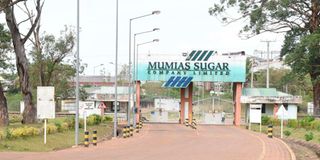
Billionaire brothers Jaswant Singh Rai (left) and Sarbjit Singh Rai of Sarai Group. The government has leased some of the state-owned sugar firms to the two brothers.
There is a new chapter in the political economy of the local sugar industry. On paper, the government has leased five State-owned sugar companies to local private mills.
In reality, what we are witnessing is a scenario where the government has just dished out management of the largest sugar mills in Kenya to a clique of politically-connected local millers and oligarchs. This is one of the major undercurrents driving the vociferous opposition to the decision by the government to lease the five State-owned sugar mills.
Picture this. Following the leases, the structure of ownership of sugar mills is now as follows. Mr Jaswant Rai will be in control of West Kenya in Kakamega; Olipito in Busia and Trans Nzoia and Naitiri factories in Bungoma. According the statistics from the Kenya Year Book of Statistics on sugar, companies owned by Jaswant controlled a 55 per cent market share in terms total sugar crushing capacity in Kenya in 2022.

Rai Group chairman Jaswant Rai.
The capture of Nzoia will now allow him to entrench and enhance his market dominance position in the industry.
Mr Ragbhir Singh Chatte (Birre) the owner of Kibos Sugar and Allied Industries with a commanding sugarcane crushing capacity market share of 12 per cent in 2022 has become the dominant player in the Kisumu Sugar belt having been gifted the state owned Chemelil Sugar Company that has a market share of 2 per cent by sugar crushed in 2022.

The Chemelil Sugar Company factory. FILE PHOTO | NATION MEDIA GROUP
The absolute wild card in the list of companies that have been gifted the leases is an entity by the name West Valley. Curiously, neither the name nor operations of this entity appear anywhere in the 2022 official statistics on sugar crushing capacity. The company is owned by a Mr Ben Soi, who is nondescript in the Kisumu sugar belt area.
In South Nyanza, Sony Sugar is now in the hands of Mr Ahmed Ali Taib of Busia Sugar. The company crushed 487,000 tons of sugar in 2022 compared to 407,000 by Busia Sugar factory. Jaswant’s brother Sarjbit Rai is in control at Mumias Sugar Company.
Clearly, the designers of the leasing transaction did not give much weight to the issue of impact on competition and entrenchment of dominance by the incumbents. Yet the tender documents stated clearly that a leasing proposal that ‘may prevent; distort or lessen competition would be disqualified.
Political tenability of stakeholder buy ability and acceptance was also not ranked highly. That is how they ended up with a privatisation option that is proving to be politically untenable.
Yes, the tenders were advertised. But for a procurement process with such big ramifications to the livelihoods of hundreds of thousands of citizens in Western Kenya; the tender advertisements that announced the bids were not prominent enough. There were separate tenders for each company. But it seems that the adverts were deliberately placed in hidden corners to pre-empt public attention and discussion.
Tenderers had to place their leasing fees pegged on specific parameters, the fee by sugar produced, proposed lease rental by the size of the nucleus and a proposed investment programme with details on the money you want to pump in into the operation.
The only time bidders interacted with procurement officials at the Ministry of Agriculture was the day of tender closing. Everything was concluded at lightning speed during the tender closing day with bidders asked to go home to wait for results.
The upshot was that the air surrounding the transaction after tender closing day is rife with un-substantiable claims about dodgy dealings that are alleged to have influenced the awards of the lucrative deals. The successful bidders received letters informing them about success of their bids, including dates when they are supposed to take over the running of companies.
Still, the most extraordinary sign of the changes that have taken root in the sugar industry is the return to the political saddle of the billionaire businessman Jaswant Rai; the biggest player in the sugar industry.
For nearly two years, the indications were that he had lost clout and influence within the corridors of power. In August 2023, he was bullied by President William Ruto into surrendering from the battle for control of the troubled Mumias Sugar Company. He was intimidated into dropping multiple cases he had instituted in court against the receiver running Mumias Sugar Company- his younger brother, Sarbi Rai.

The entrance to Mumias Sugar Company.
The president had dropped all pretences when launching the verbal assault on Rai. This is how he framed his remarks and I paraphrase: “We shall not entertain any more court cases. They must withdraw them all. I have told them that the issues are three: If they attempt to bring problems they shall have to leave the country, be taken to prison or travel to heaven (sic).” The Kiswahili version ‘mambo ni matatu’ instantly became popular.
What left no doubt in the minds of observers that the target of the president’s attack was Rai was his subsequent abduction and incarceration within the same week of the president’s outburst.
Around the same time, the media was also reporting that the Economic Crimes Unit of the Directorate of Criminal Investigations (DCI) had questioned one of Jaswant’s closest allies - the CEO of Victoria Commercial Bank Yogesh Pattni, on allegations of possible money laundering over transactions touching on the Mumias Sugar Company’s receivership process.
Jaswant had been vanquished and forced to withdraw the battery of court causes he had instituted against the Mumias Company receivership process; and bullied into surrendering control of Mumias Company to Sarbi Rai’s Sarrai Group. Has Jaswant been rehabilitated politically and under what circumstances? if he has indeed returned to good books with President Ruto, will there be major ramifications for the battle for control of Mumias?
The next stage for the battle will be the fight for control and ownership of both the ethanol and power generation plants that are located within the company’s premises. The rights over these two factories- within -a- factory belong to Jaswant through a Dubai-based entity by the name Vertox Ltd.
It is noteworthy that President Ruto, during a recent visit to Kakamega, spoke publicly in support of revival of the operations of both the power and ethanol plant and restitution of Mumias as company as a fully- fledged integrated operation primarily doing milling - but also doing ethanol and electricity production.
It was also telling that hardly a week after President’s visit, a team from Jaswant’s West Kenya Sugar stormed the Mumias factory demanding to be given access to both the power generation and ethanol plants. More telling was the fact that that the team from West Kenya came flanked by top government security officials.
Sugar cane has been a source of misery to the rural poor Kenya. In Western Kenya where the crop was introduced in the 1970s, thousands of households and rural poor were induced by money to vacate the only pieces of land they owned to give way to the so- called nucleus estates.
They were forced into landlessness and had to join the ranks of the urban poor and to live in overcrowded rural towns such as Mumias, Awendo, Muhoroni and Webuye.
The state-owned milling companies turned into vampires that sucked the blood of the farmers through weighbridges with rigged meters, meagre producer prices and payments that delayed for months on end after cane had been delivered.
At the national level, massive irregular loans from state-owned banks or from international banks were dumped on the companies ostensibly to finance expansion projects- but in reality- to create opportunities for kick-backs and backhanders for ruling elites.
The narrative that state-owned companies collapsed mainly because they were inefficient is a big myth.








